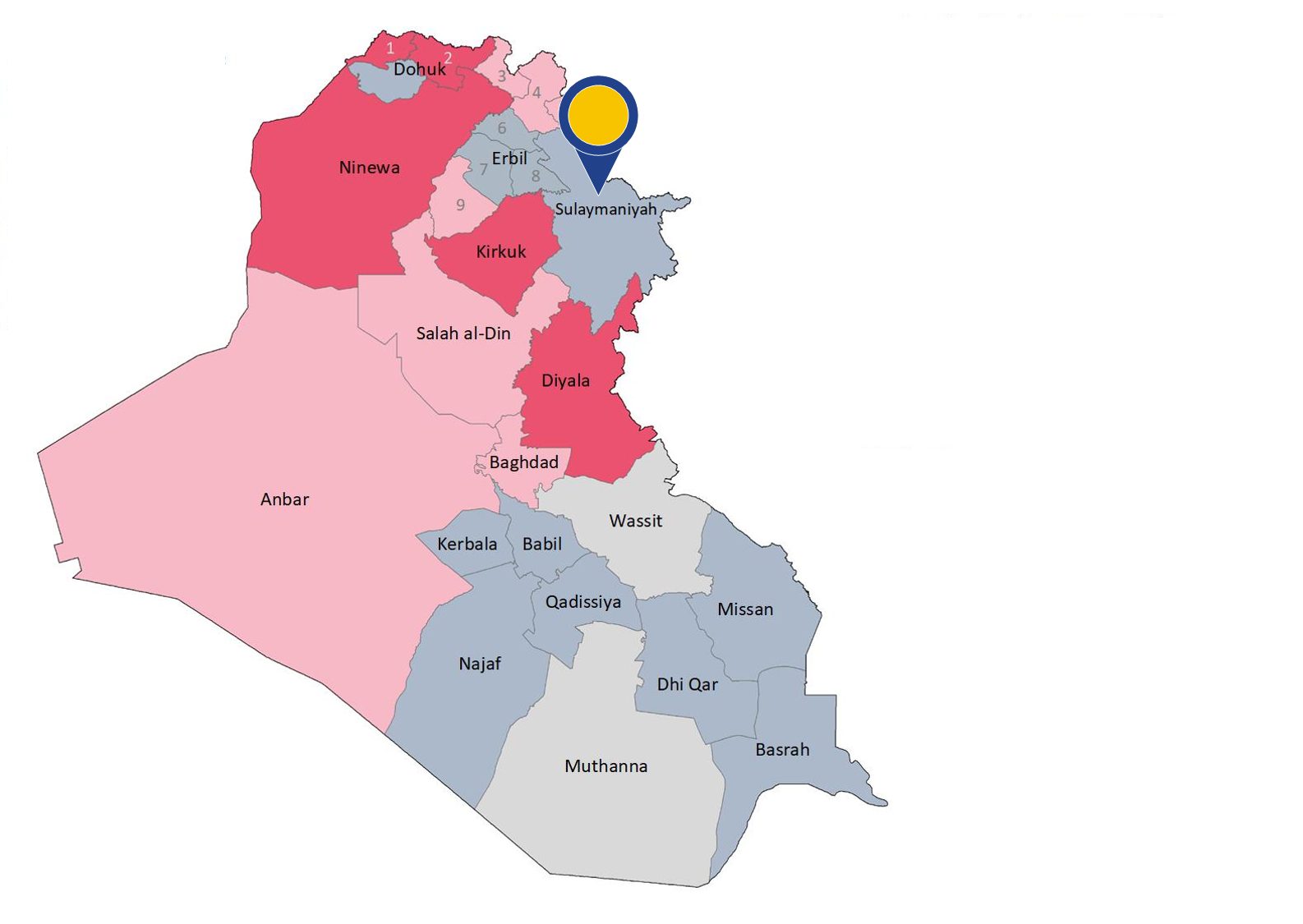Sulaymaniyah governorate is part of the KRI and is located in the northeastern part of Iraq. It borders Erbil, Kirkuk, Salah al-Din and Diyala, and shares an international border with the Islamic Republic of Iran to the east. Sulaymaniyah governorate is divided into the following districts: Chamchamal, Darbandihkan, Dokan, Halabja, Kalar, Penjwin, Pshdar, Rania, Sharbazher, and Sulaymaniyah. The Government of Iraq still considers Halabja part of Sulaymaniyah governorate. The Garmiyan region is a disputed territory between Iraqi and Kurdish forces. The capital of the governorate is Sulaymaniyah city. The governorate has an estimated population of 2 219 194. The main ethnic group in the governorate are Kurds.

Since 1998, Sulaymaniyah is under the control of the Patriotic Union of Kurdistan (PUK). The 2017 KDP-led independence referendum backfired, resulting in a reaction from the Iraqi central government and causing the loss of territorial control over most of the disputed territories, which were retaken by Baghdad. Sources have described Sulaymaniyah as ‘relatively stable’ security-wise since 2003. In Sulaymaniyah, the Peshmerga and Asayish as well as the ISF continued to conduct security operations to pursue ISIL members. The PKK has also developed its territorial presence and control over mountainous areas along the Turkish and Iranian borders, including along the border between Erbil and Sulaymaniyah governorates, from where it launched attacks on Turkish forces. In recent years, Turkey has set up military bases in key areas, including Sulaymaniyah. It has also been reported that other armed groups, such as Ansar Al-Islam and Self-Defence Force, operate in Sulaymaniyah governorate.
The Turkish forces continued to launch airstrikes and cross-border bombardments against PKK in Sulaymaniyah governorate, causing mainly damage to agriculture and farmland, as well as forcing villagers to evacuate. Civilian casualties due to Turkish airstrikes and drone attacks have also been reported. In the disputed territory of Garmiyan, ISIL sleeper cells have attacked populated areas, taking advantage of the lack of coordination between the Kurdish and Iraqi security forces. Frictions between Iraqi forces and the Peshmerga forces in disputed territories were also reported. Iranian artillery fire has been directed against Kurdish bases originating from Iran in the border areas of Sulaymaniyah. The Iran Revolutionary Guard Corps reportedly launched artillery fire and missiles against Kurdish bases inside KRI, resulting in civilian injuries and grave material damages. Riots were also recorded, with KRI security forces responding by shooting live bullets in the air. One source further indicated that the KRI borders are considered to be insecure and that violent crime is common, and that kidnappings, murders and robberies occur frequently.
ACLED reported a total of 39 security incidents (average of 0.5 security incidents per week) in Sulaymaniyah governorate in the reference period, the majority of which coded as remote violence/explosions. Security incidents occurred in all districts of the governorate with the largest overall number being recorded in Sulaymaniyah district. UNAMI recorded 5 armed conflict related incidents, 3 taking place in 2019, and 2 from 1st January until 31st July 2020 (average of 0.1 security incident per week for the full reference period).
In the reference period, UNAMI recorded a total of 21 civilian casualties (3 deaths and 18 injuries) in the aforementioned armed conflict related incidents. More specifically, 14 casualties were reported in 2019, and 7 casualties were reported from 1st January until 31st July 2020. Compared to the official figures for the population in the governorate, this represents 1 civilian casualty per 100 000 inhabitants for the full reference period.
As of June 2020, 139 860 IDPs were registered in Sulaymaniyah governorate, the majority originating from Salah al-Din governorate. Sulaymaniyah was not listed among the governorates with a presence of returnees.
Contamination by landmines and explosive remnants of war and explosive hazards contamination, including IEDs, is reported to affect several districts in Sulaymaniyah.
|
Looking at the indicators, it can be concluded that indiscriminate violence is taking place in the governorate of Sulaymaniyah at such a low level that in general there is no real risk for a civilian to be personally affected by reason of indiscriminate violence within the meaning of Article 15(c) QD. However, individual elements always need to be taken into account as they could put the applicant in risk-enhancing situations.
|
Main COI reference: Security situation 2020, 3.3
